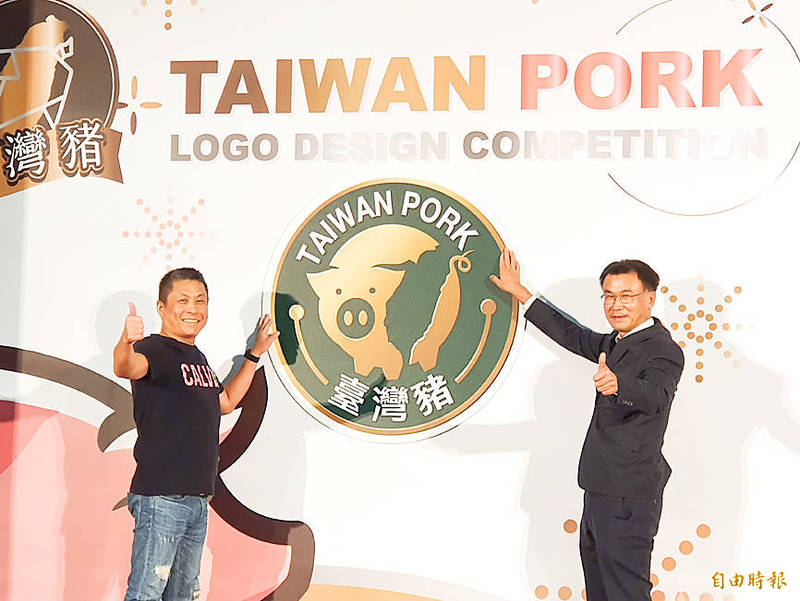《TAIPEI TIMES》 Mislabeling triggers doubt over ‘Taiwan Pork’ label

Council of Agriculture Minister Chen Chi-chung, right, and the winner of a competition to design the “Taiwan Pork” label, Lin Lee-hsun, stand next to the label at an awards ceremony in Taipei on Oct. 6. Photo: Chien Hui-ju, Taipei Times
A TRIAL MONTH: National Animal Industry Foundation executive director Wang Chung-shu said Formosa Chang was approved as its Spanish pork supply finishes this week
By Yang Yuan-ting / Staff reporter
Members of the public yesterday called into question the credibility of the government-certified “Taiwan Pork” label after braised pork rice chain Formosa Chang (鬍鬚張) was found to use the label for some products containing Spanish pork.
Although Taiwan bans the use of ractopamine on local hog farms, the Legislative Yuan on Thursday approved nine administrative directives related to the government’s decision to lift restrictions on the importation of US pork containing traces of the feed additive and beef from cattle aged more than 30 months.
The promotion of local pork through the “Taiwan Pork” label is a government measure designed to mitigate the effects of lifting restrictions on US pork imports.
The Council of Agriculture (COA) in October launched the label, saying that businesses selling local pork could apply to use it from last month.
The National Animal Industry Foundation would review applications and issue the labels to qualified applicants, the council said at that time, encouraging consumers to report label misuse.
Formosa Chang said it was approved to use “Taiwan Pork” labels throughout the nation, but customers reported that one of its lunchboxes, braised pork with anka, contained pork from Spain.
Under the Act Governing Food Safety and Sanitation (食品安全衛生管理法), companies falsely labeling products could face a fine of up to NT$4 million (US$140,090).
Formosa Chang said it had informed the foundation that a few of its products did not use local pork, but the foundation still approved it to use the label.
The restaurant chain yesterday stopped selling the lunchbox so that its products would comply with the label regulations.
Foundation executive director Wang Chung-shu (王忠恕) confirmed that Formosa Chang did reveal its use of Spanish pork in the product during the application process.
The foundation approved its application because the company said that it would be out of pork from Spain by the end of the year, Wang added.
As this month is a trial run of the label, the Food and Drug Administration (FDA) would decide whether to fine the company, he said.
Dumpling chain Bafang Yunji International Co (八方雲集) uses pork from Spain in some stores in northern Taiwan, but only local pork in the rest of the country, so it was approved to use the label in central and southern Taiwan, Wang said.
Commenting on the confusion, Wang said that the foundation would visit businesses approved to use the label to review their pork ingredients and ensure correct labeling.
Businesses that use imported pork can use FDA-certified labels, which would allow them to specify the pork’s origin, COA Deputy Minister Huang Chin-cheng (黃金城) said.
Yesterday, the Executive Yuan evaluated whether to nullify new food safety regulations promulgated by some local municipalities that demand “ractopamine-free” products, sources said.
Before deciding, the Executive Yuan would continue to communicate with local governments, hoping that they drop local ractopamine regulations, a Cabinet official said on condition of anonymity.
Among the Legislative Yuan’s approved directives on Thursday was one stipulating that imported pork products are allowed to contain ractopamine residue of up to 0.01 parts per million (ppm) in meat and skin, 0.04ppm in pig liver and kidney parts, and 0.01 ppm in other edible parts.
The lifting of the import restrictions and the administrative directives take effect on Friday.
Additional reporting by Lee Hsin-fang and CNA
新聞來源:TAIPEI TIMES











